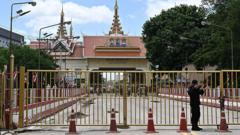The resignation of Chrystia Freeland not only disrupts the Canadian government’s current political landscape but also highlights ongoing tensions within the Liberal Party, calling into question Prime Minister Justin Trudeau’s governance strategies and future.
Trudeau Faces Political Turmoil After Freeland's Resignation

Trudeau Faces Political Turmoil After Freeland's Resignation
Freeland's departure echoes past crises, raising questions about Trudeau's leadership stability.
On Monday, the political atmosphere in Ottawa shifted dramatically when Chrystia Freeland announced her resignation as finance minister. Her decision, prompted by dissatisfaction with recent government economic policies and reported plans by Prime Minister Justin Trudeau to remove her from her position, has sent shockwaves through the Liberal Party and cast doubt on Trudeau's leadership.
Freeland’s resignation letter, which criticized the government's economic giveaways, sparked discussions reminiscent of the earlier SNC-Lavalin affair in 2019, when Jody Wilson-Raybould resigned from Trudeau's cabinet following a controversial demotion. Analysts suggest Freeland's departure could lead to a significant political realignment, jeopardizing Trudeau's control over the party.
The implications of Freeland's exit extend beyond mere cabinet reshuffling. As Trudeau grapples with criticisms—notably from former U.S. President Donald Trump’s supporters—his once-gleaming liberal image appears tarnished. McGill University Political Science Professor, Richard Schultz, remarked, “This is a potentially pivotal moment for Trudeau. The coalition foundation of his administration is critically tested.”
As the fallout unfolds, Canadians are keenly observing how this ministerial crisis will impact forthcoming policy decisions, particularly concerning economic and border security issues. With growing concerns over Trudeau's leadership trajectory, Freeland's resignation serves as a bellwether for the Liberal Party as it navigates these turbulent political waters.
Freeland’s resignation letter, which criticized the government's economic giveaways, sparked discussions reminiscent of the earlier SNC-Lavalin affair in 2019, when Jody Wilson-Raybould resigned from Trudeau's cabinet following a controversial demotion. Analysts suggest Freeland's departure could lead to a significant political realignment, jeopardizing Trudeau's control over the party.
The implications of Freeland's exit extend beyond mere cabinet reshuffling. As Trudeau grapples with criticisms—notably from former U.S. President Donald Trump’s supporters—his once-gleaming liberal image appears tarnished. McGill University Political Science Professor, Richard Schultz, remarked, “This is a potentially pivotal moment for Trudeau. The coalition foundation of his administration is critically tested.”
As the fallout unfolds, Canadians are keenly observing how this ministerial crisis will impact forthcoming policy decisions, particularly concerning economic and border security issues. With growing concerns over Trudeau's leadership trajectory, Freeland's resignation serves as a bellwether for the Liberal Party as it navigates these turbulent political waters.


















